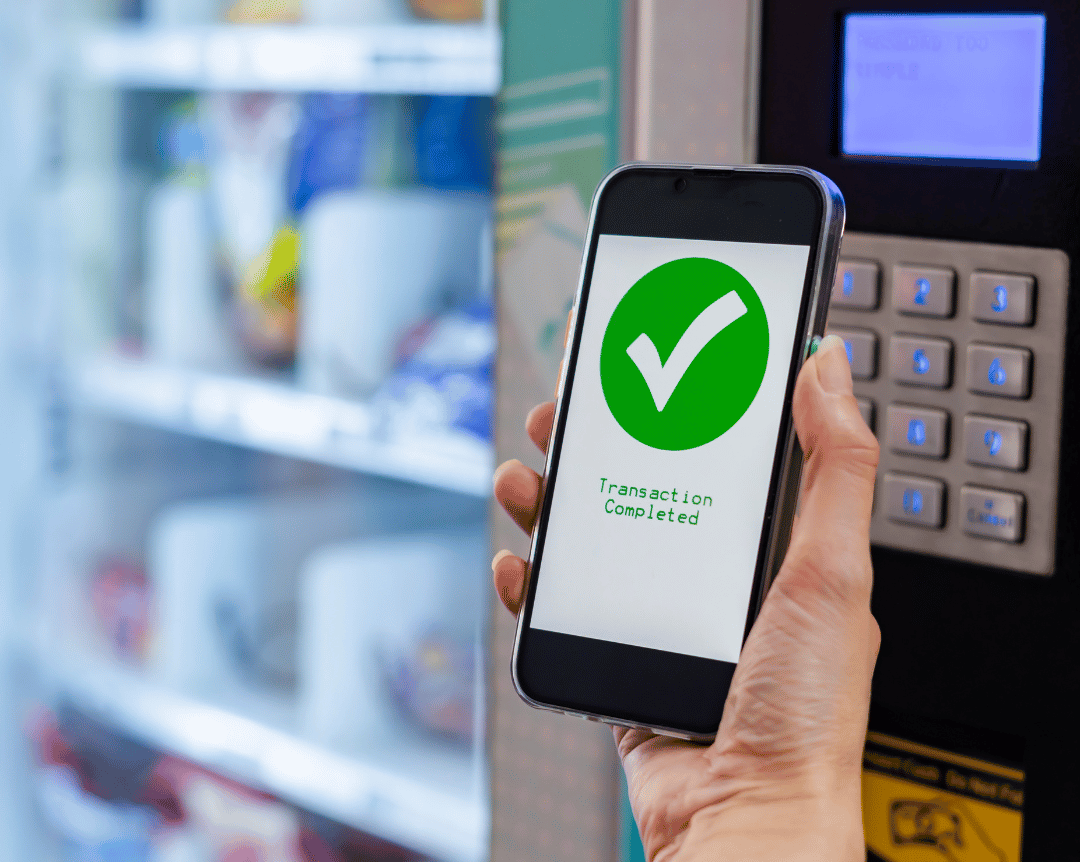In recent years, smartphone apps have become central to managing daily activities, ranging from banking and grocery shopping to entertainment and transportation. With over 257 billion mobile app downloads worldwide in 2023, it’s clear that apps significantly influence how businesses interact with their customers. It comes as no surprise, therefore, that the vending industry has increasingly adopted smartphone-based applications to enhance the consumer experience. However, this growing reliance on app-based interactions for vending machines raises an important question: Is requiring an app to use vending machines an effective strategy or a frustrating barrier for consumers?
App-enabled vending machines offer several clear advantages. Firstly, they deliver contactless transactions—a notable priority for many consumers following increased hygiene concerns in recent years. Using apps eliminates the need for physical interaction with buttons, screens, or cash, promoting a safer and cleaner purchasing experience. Additionally, vending apps provide operators with valuable consumer insights, allowing businesses to optimize their inventory management, personalize marketing efforts, and anticipate consumer demands through data-driven strategies.
Nevertheless, requiring customers to download an app just to purchase a snack or beverage can be problematic. Users already manage dozens of apps, leading to potential frustration or hesitation about installing yet another application. This can inadvertently push some customers away, especially those who prefer simpler methods such as mobile wallets and NFC payments. Furthermore, app-based systems inherently raise concerns about data privacy and security, potentially causing consumers to shy away due to mistrust or anxiety regarding how their personal information is being managed.
Given these considerations, businesses must carefully evaluate whether the convenience and operational advantages of vending apps outweigh potential customer resistance. Understanding consumer preferences, addressing data privacy transparently, and offering hybrid payment solutions may ultimately determine whether vending machine apps become widely embraced tools or barriers that hinder customer satisfaction.
Understanding Vending Machine Apps
What are Vending Machine Apps?
Vending machine apps are specialized mobile applications designed to simplify interactions between customers and vending machines. Typically, users can browse available products, select items, and complete purchases seamlessly from their smartphones. To use these apps, customers download the software onto their devices, create an account, and link a preferred payment method such as a credit card or mobile wallet. This digital process eliminates traditional barriers, providing users with an effortless and streamlined purchasing experience.
The increased adoption of vending machine apps largely reflects a consumer preference for convenient, hygienic transactions. Since the apps minimize or entirely remove physical contact with machine buttons and payment systems, they’re particularly appealing in environments prioritizing cleanliness and safety, like hospitals, offices, or public transit stations. Businesses already familiar with the advantages of cashless payments find app-based transactions a natural evolution towards enhanced customer experience and safety.
Furthermore, vending apps offer operators insightful data on consumer buying habits, product preferences, and transaction timing. Such detailed analytics empower vending machine operators to better manage inventory, predict customer needs, and streamline operations, ultimately resulting in improved business performance and customer satisfaction.
Why are Businesses Implementing Apps?
There are several practical reasons businesses increasingly favor app-based vending solutions. First, the shift from cash to digital payments significantly reduces the costs and security risks associated with cash handling. Digital transactions facilitated by apps are quicker, more secure, and more convenient for consumers, leading to shorter transaction times and higher satisfaction, particularly during busy periods.
Secondly, vending machine apps provide valuable opportunities to strengthen customer relationships. Through personalized promotions, loyalty rewards, and tailored marketing initiatives, businesses can directly engage with customers, influencing purchasing decisions and encouraging repeat business. This increased level of personalization helps companies retain customers by continuously offering relevant and appealing incentives.
In the following sections, we’ll explore both the tangible benefits and possible drawbacks of vending machine apps in detail, helping you decide whether this technology aligns effectively with your business strategy.
Advantages of App-Based Vending Machines
Enhanced Customer Engagement
One major advantage of vending machine apps is their ability to significantly boost customer engagement. Through personalized notifications, customized promotions, and targeted loyalty rewards, businesses can directly communicate with customers, incentivizing repeat interactions and building lasting brand loyalty.
Improved Hygiene and Safety
In the wake of heightened health concerns post-pandemic, vending machine apps offer critical hygiene benefits. By eliminating physical interactions with touchscreens, buttons, and cash, app-based vending solutions provide a safer, cleaner purchasing environment. Mastercard’s global consumer survey highlighted how contactless solutions have become increasingly preferred due to their improved hygiene and convenience, especially in high-traffic areas such as hospitals, workplaces, and public transportation hubs.
Streamlined Operations for Businesses
Apps don’t just enhance consumer convenience; they also streamline operational efficiency. With real-time data on inventory levels, consumer preferences, and transaction patterns, vending operators can optimize stocking procedures, reduce downtime, and predict customer demand. Enhanced data analytics facilitate smarter decision-making, allowing businesses to increase profitability while improving service reliability and customer satisfaction. Oracle emphasizes how businesses leveraging analytics gain significant competitive advantages through improved inventory management.
Challenges and Downsides of Requiring an App
Barrier to Entry and User Frustration
Despite the numerous advantages, requiring consumers to download an app can present significant barriers. Customers frequently experience “app fatigue,” a phenomenon where the inconvenience of installing yet another app outweighs perceived benefits.
Data Privacy Concerns
Consumer apprehension regarding privacy and data security presents another obstacle to vending app adoption. Many users worry about how their personal information will be stored, used, or potentially compromised. Pew Research Center emphasizes that privacy concerns significantly influence consumer behavior, making transparency and robust data protection measures critical to earning consumer trust in app-based vending solutions.
Dependence on Mobile Connectivity and Technology
Another challenge is the dependence on reliable mobile connectivity and technology. Poor network reception, app crashes, or software compatibility issues can disrupt service, leaving customers frustrated and reducing the perceived convenience of app-based transactions. Business Insider highlights how connectivity issues remain a significant barrier for mobile payment adoption, especially in locations without consistent network coverage.
Balancing App Use with Traditional Options
Hybrid Approaches for Maximum Reach
Recognizing the challenges associated with exclusive app-based solutions, many vending operators opt for hybrid approaches that blend traditional payment methods with modern app capabilities. Offering multiple payment options—including cash, credit and debit cards, mobile wallets, and app-based transactions—maximizes convenience for diverse customer preferences, ensuring no consumer segment feels excluded.
Best Practices for Introducing Vending Machine Apps
How to Successfully Encourage App Adoption
Successfully introducing a vending machine app requires clear value propositions and transparent communication. Businesses should emphasize tangible benefits, such as exclusive discounts, loyalty points, and personalized recommendations, to motivate downloads. Additionally, addressing privacy concerns upfront by clearly communicating data security measures can reassure skeptical customers.
Vending machine apps undeniably offer substantial advantages, including improved hygiene, enhanced customer engagement, and operational efficiencies. However, businesses must thoughtfully navigate potential obstacles such as app fatigue, privacy concerns, and technical challenges. By adopting a balanced approach—offering multiple payment methods, transparently addressing data privacy, and carefully communicating the benefits—companies can successfully leverage vending apps to enhance both customer satisfaction and operational performance. Ultimately, understanding customer expectations and preferences will determine whether app-based vending solutions prove beneficial or become unnecessary barriers in your business strategy.



